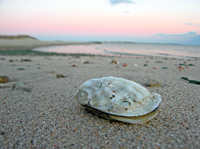 In this delightful poem, English poet John Kenyon* (1783-1856) mocks the pretentious and complacent 19th-century British traveler who avoids mixing with the local populations, learns little that touches or changes him, then returns home to pontificate on (and brag about) what he has observed from the comfort of his train car. Kenyon reminds us that if we fail to open ourselves emotionally to that which we encounter as we drift around the bay that is our life, we risk becoming like the well-travelled oyster who — “shut within
his sulky shell, he nought hath seen.”
In this delightful poem, English poet John Kenyon* (1783-1856) mocks the pretentious and complacent 19th-century British traveler who avoids mixing with the local populations, learns little that touches or changes him, then returns home to pontificate on (and brag about) what he has observed from the comfort of his train car. Kenyon reminds us that if we fail to open ourselves emotionally to that which we encounter as we drift around the bay that is our life, we risk becoming like the well-travelled oyster who — “shut within
his sulky shell, he nought hath seen.”
The Travelled Oyster, by John Kenyon
An oyster, upon oozy bed,
Like his forefathers, born and bred,
It chanced, was wafted far and wide
By force of wind and force of tide;
Nor are there wanting folk to say
He drifted fairly round the bay.
At last he drifted back agen;
The very finest one might ken
Of travelled oyster-gentlemen.
For, though ne’er out of his own shell,
He saw, or thought he saw, as well,
And was, or deemed himself, as wise
As fishes who use fins and eyes.
In secret news he yields to none;
Knows all the deeds by muscles done;
‘Mong limpets what dark plots are hatching,
What territory prawns are snatching;
And has—from information—glimpse
Of coming war among the shrimps.
On all who hap within his reach,
(For ’tis his darling pride to teach)
He rolls that tongue which none may quell;
While every brother of the shell
Is sadly bound to stand the shock,
Chained, like Prometheus, to his rock.
And, Reader! we have seen, I wis,
Full many a dull-brained fish like this,
Who, having drifted Europe round,
Floats back at last to his old ground;
And though, like oyster, shut within
His sulky shell, he nought hath seen,
Yet still, in right of foreign travel,
Assumes to talk—instruct and cavil.
Speak of a church—he quotes Saint Peter’s;
A watch—he cites Breguet’s repeaters ;
And e’en the trout, on which we dine,
Would have been better from the Rhine;
While we, chair-bound and wretched quite,
Are forced to feign a mien polite.
Good Reader! were it ours to choose,
Such ne’er should quit their native ooze;
Or ne’er, at least, should hit the track
Which brings them, for our torture, back.
From “Poems: For The Most Part Occasional” By John Kenyon.
———————————————-
*Son of a wealthy English West Indian merchant, native of Jamaica and graduate of Cambridge, John Kenyon cultivated the acquaintance of Coleridge, Southey, Wordsworth, Browning and other eminent poets. He visited Italy (1815) and other parts of the continent; he bestowed a large legacy to his friends at his death.